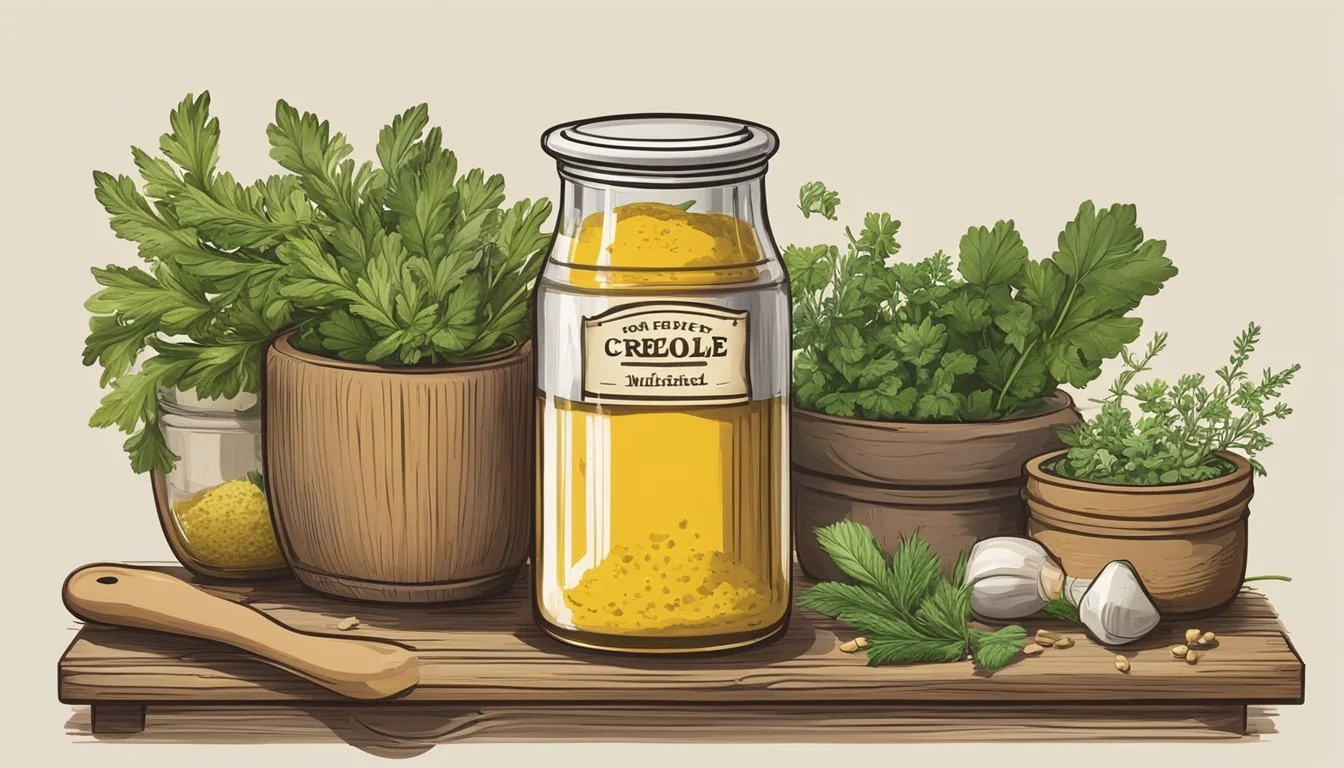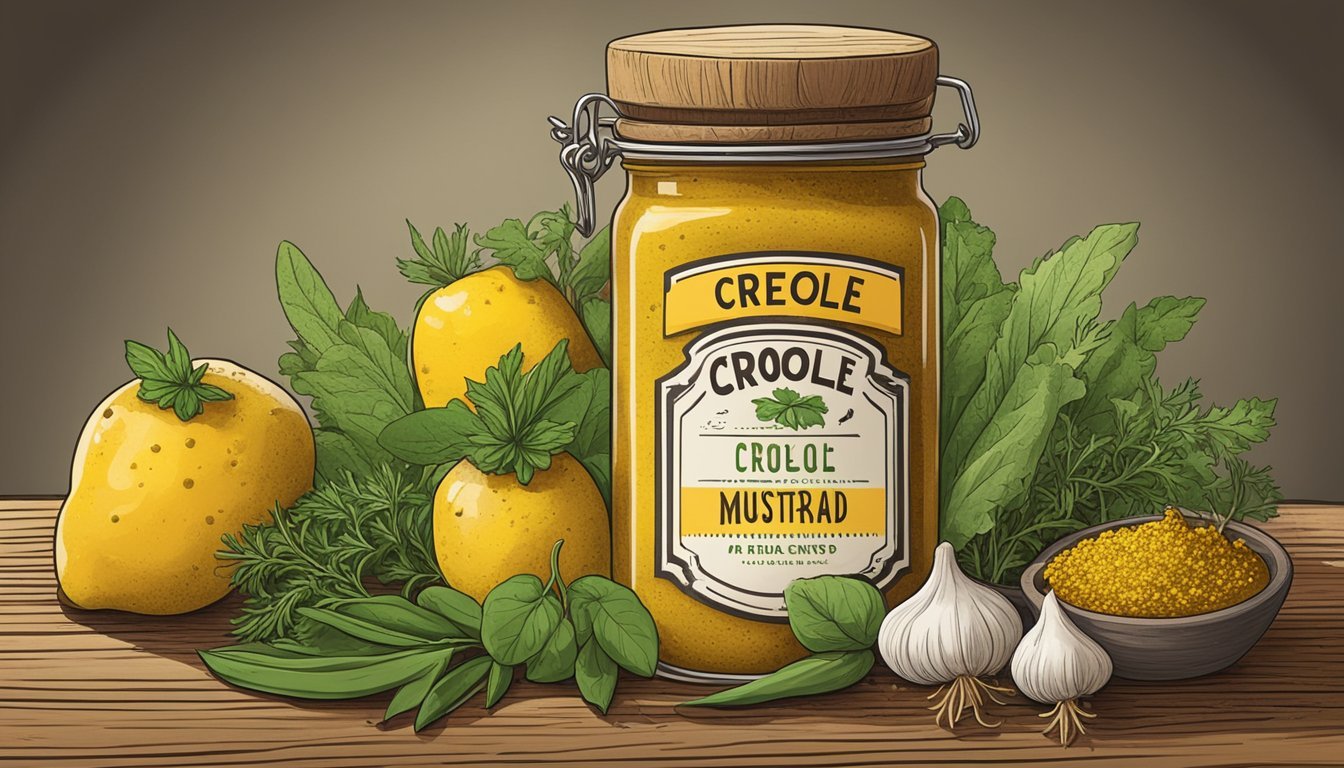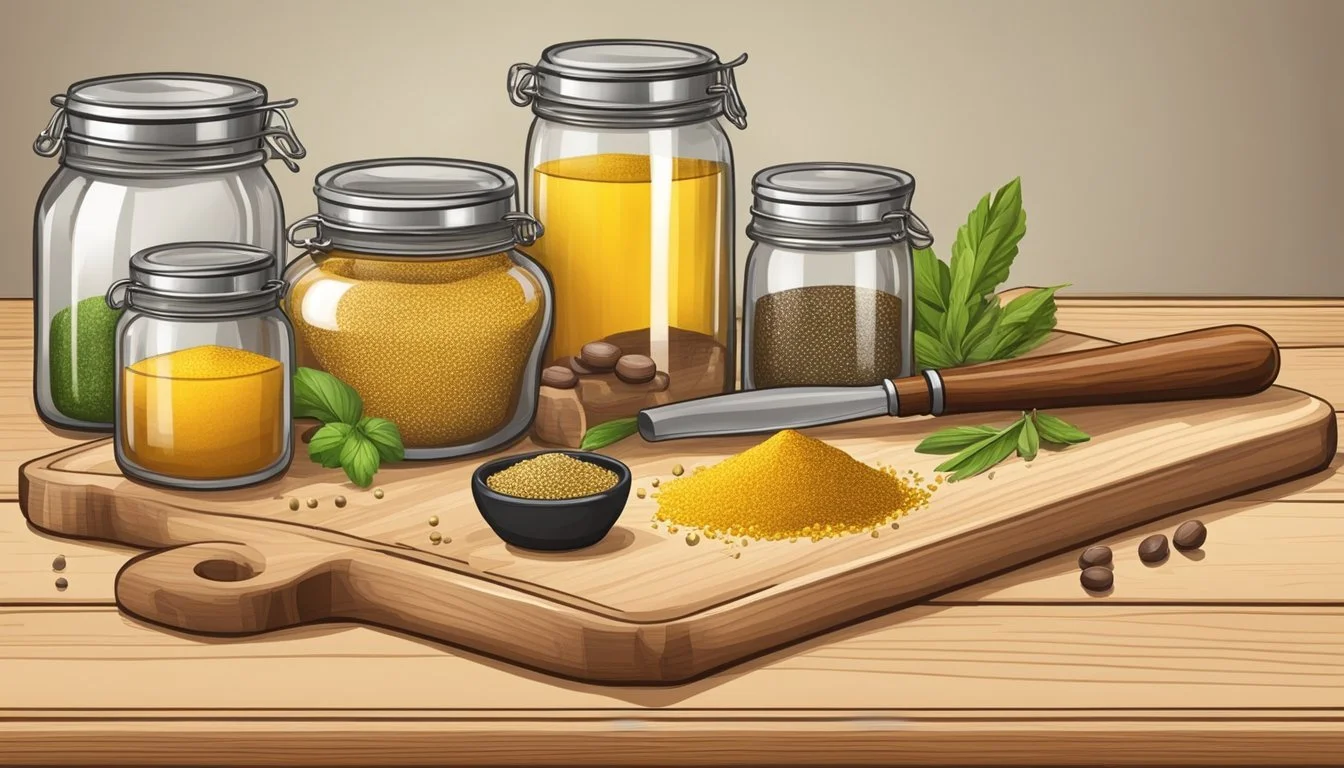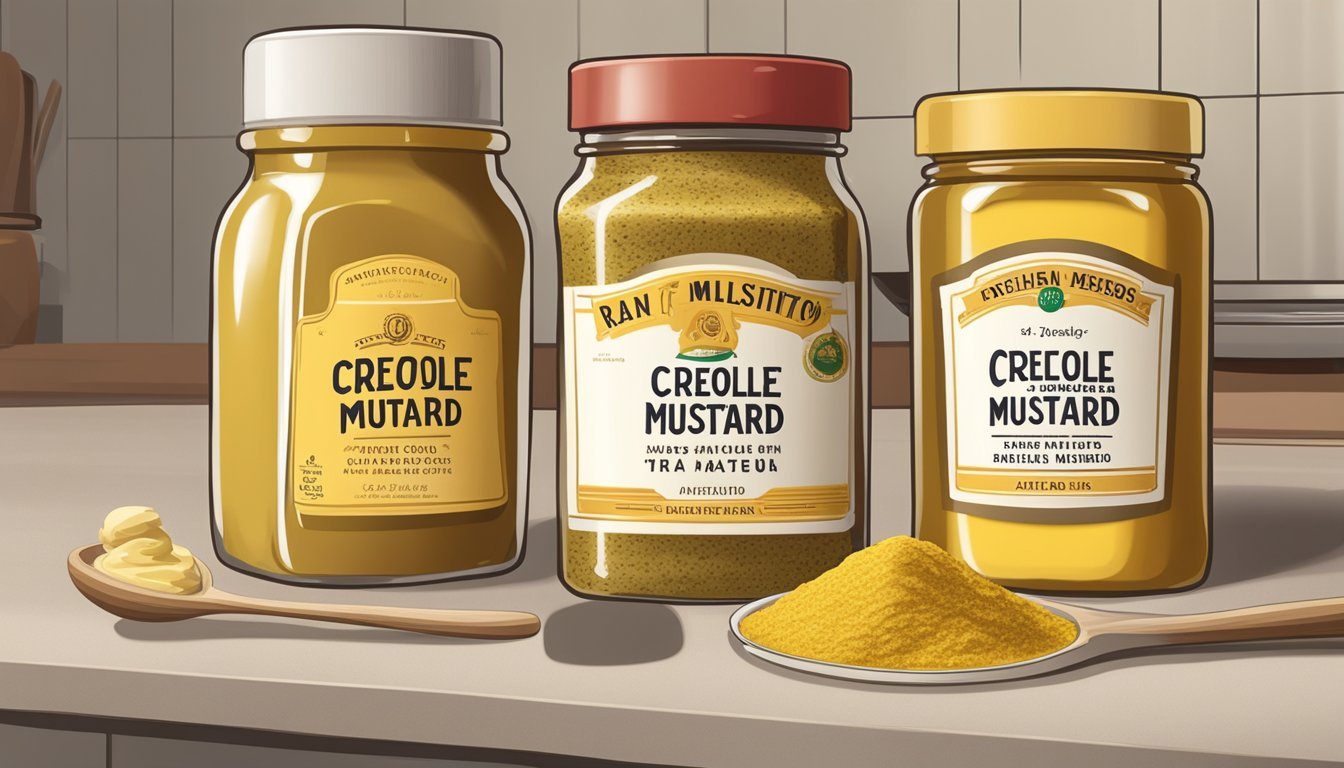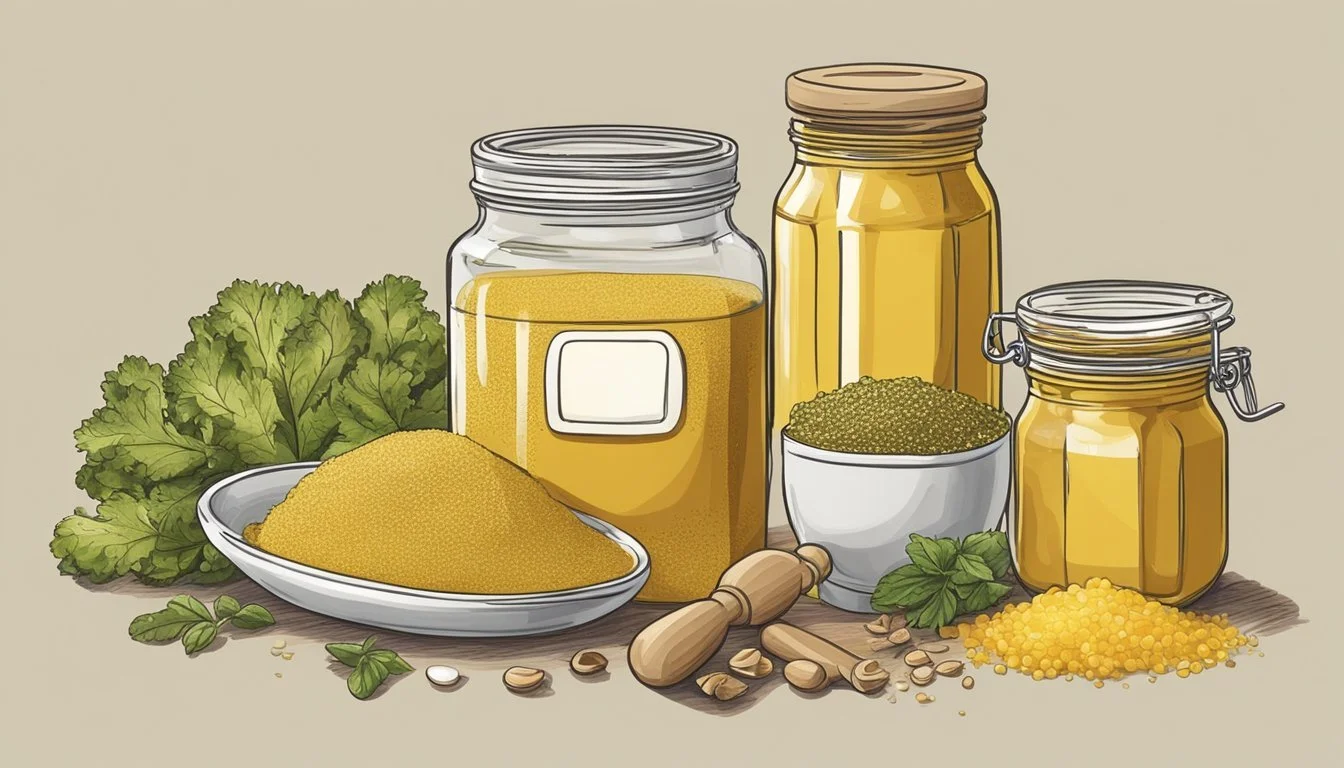Creole Mustard Substitutes
Top Alternatives for Your Recipes
Creole Mustard is a staple condiment originating from the culinary traditions of New Orleans, where it's known for its grainy texture and spicy, tangy flavor. The distinctive taste of Creole Mustard comes from the use of brown mustard seeds marinated in vinegar, often with the addition of garlic, horseradish, and other spices. It's a key ingredient in many regional dishes, enhancing everything from sandwiches to sauces with its bold flavor.
When Creole Mustard is not available, various substitutes can be used to achieve a similar zest in cooking. Alternatives include Dijon mustard, known for its creamy texture and sharp taste, and Whole Grain Mustard, which offers a comparable coarseness with a slightly different spice profile. While each substitute carries its own unique flavor notes, they can effectively replace Creole Mustard in recipes, retaining the essence of the dish while introducing new flavors.
When selecting a Creole Mustard substitute, it's essential to consider the specific characteristics of the condiment that the recipe requires. Whether the dish needs the smooth consistency of Dijon or the textured pop of whole grain mustard seeds, there is a range of options to maintain the spirit of New Orleans' cuisine. These alternatives provide both home cooks and professional chefs with the flexibility to adapt their dishes without sacrificing the depth and richness associated with Creole Mustard.
Understanding Creole Mustard
Creole Mustard is a staple in southern Louisiana cuisine, recognized for its robust flavor and versatility in cooking. With its roots deeply embedded in New Orleans culture, this condiment is an integral part of the region's culinary identity.
Origins and Regional Significance
Creole Mustard originated in Louisiana, particularly in New Orleans, where it's a paramount ingredient of Cajun and Creole cuisine. Its production and use have been linked with the local food culture, where it's not simply a condiment but a historical artifact representing the fusion of French, African, and Spanish influences in the region.
Key Ingredients
The primary ingredients of Creole Mustard are:
Brown mustard seeds: They form the base of the mustard and offer a pungent flavor.
Vinegar: It adds acidity to the mustard, enhancing its shelf life and flavor.
Spices: Ingredients like garlic, allspice, and Creole seasoning contribute complexity to its taste.
Flavor Profile
Creole Mustard is known for its sharp, tangy flavor with a slightly spicy kick, derived from a unique blend of spices. Unlike milder mustards, it brings a pronounced taste to dishes, thanks partly to the quality of mustard seeds and the specific spice mix used, including hints of garlic and possibly horseradish.
Culinary Uses
In cooking, Creole Mustard is highly versatile. It's commonly used with:
Meats: Enhancing flavors of pork, beef, and chicken.
Sandwiches: Offering a spicy twist to traditional dressings.
Salads: As an ingredient in vinaigrettes. Its bold taste makes it a favored addition to recipes requiring a distinct, zesty touch.
Finding the Right Substitute
When seeking a Creole mustard substitute, it's crucial to consider how well potential alternatives mimic the flavor profile and texture of true Creole mustard. These facets are vital for making sure your dish retains its intended character.
Must-Have Qualities in a Substitute
Flavor: A good substitute should possess a balance of tanginess and a hint of heat. Creole mustard typically offers a unique piquancy, which is why alternatives like Dijon mustard may be suitable due to their similar sharp and tangy flavor profiles.
Texture: Authentic Creole mustard is known for its slightly coarse, grainy texture. Substitutes such as whole grain mustard can provide a comparable consistency, and ensure the mustard presence is felt rather than just tasted.
Spiciness: While Creole mustard isn't overly spicy, it should have a bit of heat. Options like stone-ground mustard can bring a similar spiciness to your dishes, but caution is advised with beer mustard as it tends to be hotter, so one may want to use it sparingly.
Role in Recipes
Binding Agent: Mustard often acts as an emulsifier in dressings and sauces. Substitutes need to be capable of performing this function without causing separation.
Flavor Enhancer: In cooking, Creole mustard's acidic component can help brighten other flavors. A substitute must provide a similar acidity to maintain this balance. Mustards that incorporate vinegar, like whole grain varieties, usually satisfy this need.
Visual Appeal: Creole mustard's grainy appearance can add visual texture to a dish. Substitutes should, if possible, mirror this aspect to keep dishes as close to the original as possible. Whole grain or stone-ground mustards are prime candidates for this aspect.
Popular Creole Mustard Substitutes
Finding an alternative to Creole mustard involves considering substitutes that offer a similar tangy, spicy kick. The following options provide a range of flavors and textures, perfect for various dishes that usually call for Creole mustard.
Dijon Mustard
Dijon Mustard comes from Dijon, France. With a creamy texture and sharp tanginess, it is a preferred choice for sandwiches and can be used in dressings and marinades.
Spicy Brown Mustard
Spicy Brown Mustard, known for its robust flavor, complements meats and hearty dishes, making it a versatile Creole mustard alternative.
Whole Grain Mustard
With its coarse texture and rich flavor, Whole Grain Mustard is suitable as a one-for-one substitute and adds a noticeable crunch to recipes.
Yellow Mustard
Yellow Mustard is milder and more acidic, but its widespread availability makes it a convenient quick fix for those seeking a less spicy option.
Hot Mustard
Hot Mustard captures the heat of Creole mustard, making it a fitting choice for spice enthusiasts looking to retain that fiery element in their dishes.
Stone-Ground Mustard
Stone-Ground Mustard, hotter than its Creole counterpart, requires a light hand to avoid overpowering dishes yet provides a similar depth of spice.
Honey Mustard
For a sweeter twist, Honey Mustard brings both sweetness and mild spice, suitable for dressings and as a dip.
German Mustard
German Mustard varies widely, but typically it presents a good balance of heat and acidity that can stand in place of Creole mustard in many recipes.
French Mustard
While French Mustard may refer to various types, generally, it features a less spicy profile than Creole mustard, with a smooth consistency great for milder versions of traditional Creole dishes.
Homemade Substitutes for Creole Mustard
Creating homemade substitutes for Creole Mustard is achievable through basic recipes and customizable blends tailored to taste preferences. Using common ingredients like brown mustard seeds, white wine vinegar, and a mix of spices, individuals can prepare a mustard that closely mimics the original's flavor profile.
Basic Home Recipes
To craft a Basic Creole Mustard Substitute, one starts with the essential foundation of brown mustard seeds—known for their warm, piquant flavor. A common approach includes:
Soaking a quarter cup of brown mustard seeds in white wine vinegar overnight.
Blending the soaked seeds with a teaspoon of honey, a pinch of salt, and minced garlic to round out the flavor.
This simple base serves as a springboard for further experimentation with additional spices and herbs to match the complex taste of true Creole Mustard.
Ingredient Quantity Instructions Brown mustard seeds 1/4 cup Soak in vinegar White wine vinegar 1/2 cup Use for soaking Honey 1 teaspoon Blend with seeds after soaking Garlic (minced) 1 clove Add for complexity Salt To taste Add for seasoning
Creating a Custom Blend
For enthusiasts longing for a more in-depth culinary experience, Creating a Custom Blend is the next step. This involves integrating a variety of spices—such as horseradish, allspice, or even a pinch of nutmeg—for an individualized kick.
One might start with the basic recipe and include:
A half teaspoon of ground allspice.
A dash of nutmeg, to add warmth.
A bit of additional honey if a sweeter, more nuanced flavor is preferred.
Experimentation is key, and the proportions of these ingredients can be tweaked to achieve a Creole Mustard substitute that satisfies both personal taste and the demands of recipes calling for this Southern staple.
Spice Suggested Start Quantity Purpose Allspice 1/2 teaspoon Adds a peppery, sweet undertone Nutmeg A pinch Contributing warmth Honey (optional) Additional to taste For a sweeter, nuanced flavor
In both cases, individuals should remember to taste and adjust their mixture. They should strive for a balance of tangy, sweet, and spicy notes characteristic of Creole Mustard.
Non-Mustard Alternatives
When traditional mustard isn't an option, there are still plenty of robust and flavorful condiments that can take its place in recipes. From the pungent kick of horseradish to the fiery zest of various hot sauces, each alternative brings its own unique profile to dishes.
Horseradish-Based Options
Horseradish is a potent root with a sharp, sinus-clearing pungency that can provide the intensity one might miss from Creole mustard. It's most commonly found in prepared form, often creamed or in a sauce, and can be used sparingly as a direct substitute in dressings or marinades. The assertiveness of horseradish makes it especially suitable for savory meat dishes.
Prepared Horseradish: Use in small amounts as it is more potent than mustard.
Using Hot Sauce
Hot sauces, especially those from regions with Creole culinary influences like Tabasco, add both heat and tang. While the texture is different from mustard, they can embody the spirit of Creole flavors. Hot sauces are best used in liquid-based recipes such as soups, stews, or as a component for marinades and dips.
Tabasco: A classic choice with a familiar sharpness and heat.
Other Hot Sauces: Choose based on the desired heat level and flavor profile.
Other Condiments
A few other condiments can be utilized in lieu of mustard to impart tanginess or spice. Worcestershire sauce provides a complex, savory note to dressings and meat marinades, while vinaigrettes offer the desired acidity with a more subdued spice.
Worcestershire Sauce: Use for umami depth with a subtle spice.
Vinaigrettes: Made with vinegar and oil, they provide a tangy flavor suitable for salads and cold dishes.
Incorporating Substitutes in Dishes
When substituting Creole mustard in recipes, it's crucial to consider the flavor profile and cooking method to ensure a harmonious outcome. The alternatives can vary in heat, tanginess, and sweetness, which can be adjusted to suit the dish.
Dressings and Marinades
For dressings and marinades, Dijon mustard is a suitable replacement, providing a sharp, tangy flavor that enhances vinaigrettes and marinades for meats. It's critical to use it in moderate amounts due to its potency compared to Creole mustard. The following is a simple recipe adjustment:
Creole Mustard in Recipe: 2 tablespoons
Dijon Mustard Substitute: 1 tablespoon
This substitution keeps the balance while maintaining a similar mustard-forward taste in dressings and marinades.
Soups and Sauces
In soups and sauces, stone-ground mustard is recommended when Creole mustard is not available. It offers a comparable texture and a robust flavor. One should note its heightened heat when incorporating it into recipes such as rémoulade sauce or gumbo. To moderate the spiciness, one can start with half the amount and adjust according to taste.
Main Courses
Main courses that call for Creole mustard, including seafood dishes and sandwiches, can benefit from using hot mustard as an alternative. Hot mustard provides a similar spice level, complementing the flavors of meats and seafood without overpowering them. For instance, when preparing a glaze or rub, one might use:
Creole Mustard in Recipe: 3 tablespoons
Hot Mustard Substitute: 2 tablespoons
This swap should retain the intended spiciness and add depth to the main dishes.
Salad Dressings
Lastly, within salad dressings, a mixture that includes horseradish can emulate the complex flavors of Creole mustard. While horseradish is more pungent, merging it with ingredients like honey or apple cider vinegar can offer a balanced taste suited for salad dressings. Using a beer mustard variant might be too overpowering, hence it's suggested to stick with the horseradish blend.
Remember to taste and adjust these substitutes as you go, considering their unique characteristics in your dishes.
Considerations for Food Pairing
When replacing Creole mustard in a dish, one must consider how the substitute will interact with the other flavors and textures present, as well as how it aligns with the accompanying spices and herbs.
Matching Flavors and Textures
Creole mustard typically offers a vibrant tang and a slightly coarse texture which may be integral to the balance of flavors and mouthfeel in a dish. When selecting a substitute, one should consider:
Dijon Mustard: Provides a sharp, tangy flavor with a smooth, creamy texture, making it suitable for sandwiches or as a base in dressings.
Stone-Ground Mustard: Exhibits a pungent flavor with a grittier texture, which can be a good match when a bold taste and more rustic texture are desired.
One should adjust the quantity based on the intensity of the substitute to maintain harmony with other ingredients, particularly in recipes like cheese plates where the balance of taste and texture is essential.
Complementary Spices and Herbs
The intricate spice profile of Creole mustard calls for thoughtful pairing when it comes to herbs and spices. One should be mindful to complement or contrast the mustard's inherent warmth and complexity. A substitute should work in tandem with the palette of spices and herbs in the dish. Key pairings might include:
Thyme and Cayenne: These can further accentuate the mustard's spiciness, providing depth to dishes.
Parsley or Chives: For a fresher and slightly milder approach, which can help bridge the gap between the sharpness of the mustard and more delicate ingredients.
By carefully considering the interplay between the mustard substitute and the spices and herbs in a recipe, one can replicate or even enhance the intended flavor profile of the dish.
Storage and Shelf Life of Substitutes
When seeking alternatives to Creole mustard, it is crucial to understand the specifics of store techniques and strategies for maximizing freshness to ensure these substitutes retain their quality over time.
Proper Storage Techniques
For most mustard substitutes, storage in a cool, dry place away from direct sunlight is recommended. Glass jars with tight-sealing lids are ideal for preserving the potency of flavors.
Dijon Mustard: Should be kept refrigerated after opening. It typically has a shelf life of up to one year if stored properly.
Stone-Ground Mustard: Best when refrigerated after breaking the seal. A well-sealed container will keep for about 12 to 18 months.
Beer Mustard: Due to its unique ingredients, beer mustard should also be refrigerated once opened and can last for several months up to a year.
Maximizing Freshness
Maximizing the freshness of mustard substitutes is key to maintaining their intended flavor profile and texture.
Seal Tightly: After each use, ensure the lid is secured firmly to limit exposure to air.
Consistent Temperature: Keep refrigerated items at a steady temperature, ideally between 35° to 39°F (1.5° to 4°C).
Avoid Contamination: Use clean utensils when scooping to prevent spoilage.
By adhering to these storage recommendations, shelf life can be extended, providing a nearly consistent taste and quality similar to the original Creole mustard over time.
Health and Nutrition Considerations
When considering substitutes for Creole mustard, one must look beyond taste and texture to evaluate how they align with dietary goals and health needs.
Caloric and Nutritional Differences
Mustard varieties differ in their nutritional profiles, including their caloric content, macronutrient ratios, and presence of additional nutrients. For example, a typical serving of Dijon mustard offers a low-calorie option with a notable amount of selenium. On the other hand, Beer mustard, which might be used as a substitute, could contain more calories due to the inclusion of beer. The alcohol is typically cooked off, but the residual sugars could contribute additional calories.
Whole Grain Mustard tends to have a similar calorie count to Creole mustard but may have a higher fiber content due to the presence of mustard seeds. Below is a brief comparison of these mustards in terms of calories and nutrients:
Mustard Variety Approx. Calories per Tablespoon Noteworthy Nutrients Creole Mustard 5-10 Vitamin C, fiber Dijon Mustard 5-10 Selenium, magnesium Beer Mustard 10-20 Depends on beer used Whole Grain Mustard 10-15 Fiber, antioxidants
Allergy and Dietary Restrictions
One must take into account that some mustards may contain ingredients triggering allergies or are not suitable for certain dietary restrictions. Most mustard varieties are inherently gluten-free, but those with a gluten intolerance should look closely at Beer Mustard, as beer can contain gluten unless stated otherwise. Additionally, Dijon mustard is typically made with wine, which can pose a concern for individuals following strict alcohol-free diets.
For vegans, most mustards are acceptable, but it's always important to read labels for hidden animal-derived ingredients. As with all food substitutions, individuals should check product labels for any potential allergens or dietary conflicts, ensuring that their mustard choice aligns with their health considerations and dietary needs.

